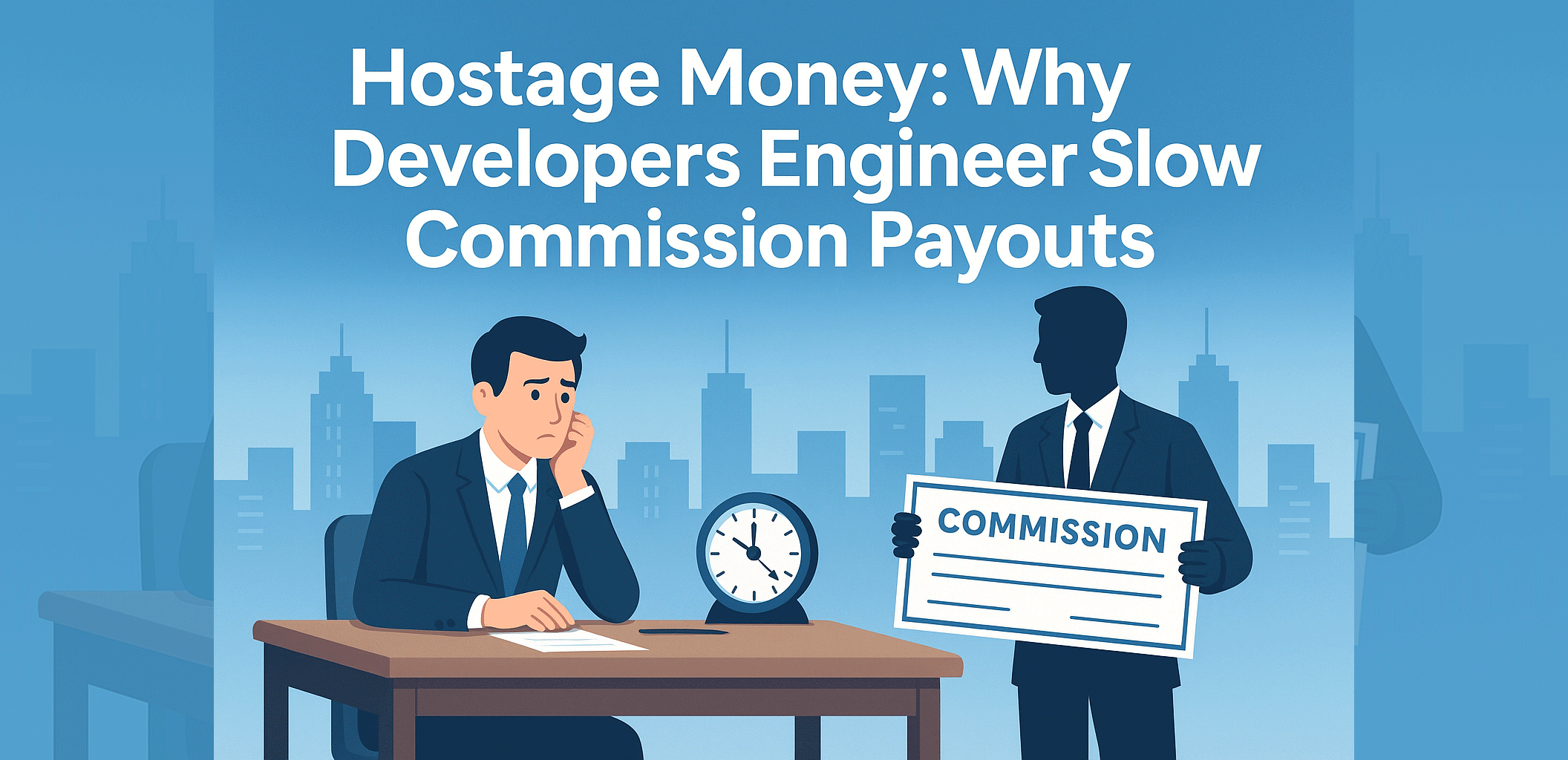Hostage Money: Why Developers Engineer Slow Commission Payouts

It is the oldest frustration in real estate: the sale is closed, the SPA is signed, the revenue is secured—yet the commission remains unpaid. Weeks bleed into months, sometimes years.
Delayed commission is not an accident; it is a structural flaw and a deliberate cash management strategy. Developers prioritize their own survival, manage their cash selectively, and build legal loopholes that ensure your agency is always the last to be paid.
Let's unpack the hard economic and cultural reasons this slow-pay crisis persists.
1. The Financial Lie: The Zero-Downpayment Gap
Your value delivery is front-loaded—you secure the buyer, the booking, and the developer's immediate revenue stream.
The developer's cash realization, however, is back-loaded, tied to progressive payments, construction milestones, and bank releases. They use this gap to justify holding your money hostage.
This is especially critical in projects offering zero downpayment (or a very low downpayment). While this makes the sale easy for the buyer and fast for your agency, it means the developer receives no immediate cash from the transaction. Their initial working capital comes entirely from the buyer's loan disbursement, which is released in stages as construction progresses.
They rationalize the delay: "Since we receive our cash in stages, we'll only pay you when our books catch up." This ignores the fact that your work is 100% complete. This "Value Delivered" paradox ensures the developer leverages your capital to finance their operations, making you an involuntary creditor. The first few batches of progressive payments are almost always funnelled directly to contractors to keep the build on schedule, leaving you last in line.
2. Payout Hierarchy: Contractors Always Win
In the developer's financial survival strategy, contractors outrank agents. This is pure operations logic:
- Contractors control physical progress. If they stop, the project stalls, breaching loan covenants.
- Agents control sales velocity. If they slow down, the project still moves forward.
When cash flow tightens, payments are immediately diverted to the parties that control the build schedule. Your commission becomes negotiable and deferrable because they perceive your threat to their immediate operations as low.
3. Delayed Payouts are a Symptom of Sickness
A fast-paying developer is financially healthy. A slow-paying developer is masking structural weakness. Payout delays are often a direct result of:
- Cash Starvation: Poor pre-sales, high interest on bridging loans, or delayed milestone releases.
- Poor Management: Failure to anticipate payables or secure adequate project financing.
When the developer is in survival mode, your commission is reclassified from a liability to a luxury. It joins the queue behind suppliers, consultants, and contractors. Payouts stretching past six months are a glaring red flag indicating financial distress, not policy.
4. The Engineered Loopholes in Your Contract
The Appointment Letter (AL) is not a shield; it is often a blueprint for delay. Developers use carefully drafted clauses to defer liability and create multiple exit routes:
- Tying Payout to Disbursement: Payment is set for X days from full loan disbursement, not SPA signing.
- Contingency Clauses: Payment is subject to no termination for 12 months or upon project reaching stage Y.
When these terms exist, the delay is not accidental—it is engineered and legally defensible. You signed the mechanism that allows them to hold your cash.
5. Predatory Ethics: Profiting from Your Pain
Some developers go beyond mere delay; they create a predatory profit loop. They deliberately withhold your commission, creating a cash flow crisis for your agency, and then:
- They partner with (or own) related-party financing firms.
- They offer you a "commission advance"—charging interest on the money that was rightfully yours to begin with.
This is not a partnership; it is an extraction model. They manufacture your problem and then profit by lending you your own capital back.
6. The Culture of Non-Enforcement
This culture persists because developers face minimal resistance. Most agencies view chronic delay as the "cost of doing business" and lack the resources or appetite to pursue legal action. Developers know this leverage, and they will stretch payment cycles until they hit resistance—which, for most, is never.
How to Protect Your Agency’s Cash Flow
Delayed commission is a systemic risk, but you can mitigate it:
- Audit First: Get references from peers, not the developer’s marketing team. Track record is everything.
- Negotiate Triggers: Insist on payout clauses tied to the SPA signing date, not vague disbursement milestones.
- Refuse Vague Terms: Demand clear, dated deadlines. If they hesitate, walk away.
- Enforce Formally: Document all follow-ups. If a developer is a repeat offender, terminate the relationship—loyalty is worthless when you're unpaid.
Final Verdict: Speed Reflects Respect
A developer’s payout speed is a precise barometer of their ethics, financial health, and respect for your agency.
Fast payers view you as a partner and an asset. Slow payers view you as a disposable vendor whose cash they are entitled to hold. You have delivered your value. Do not let them hold it hostage.











































































































